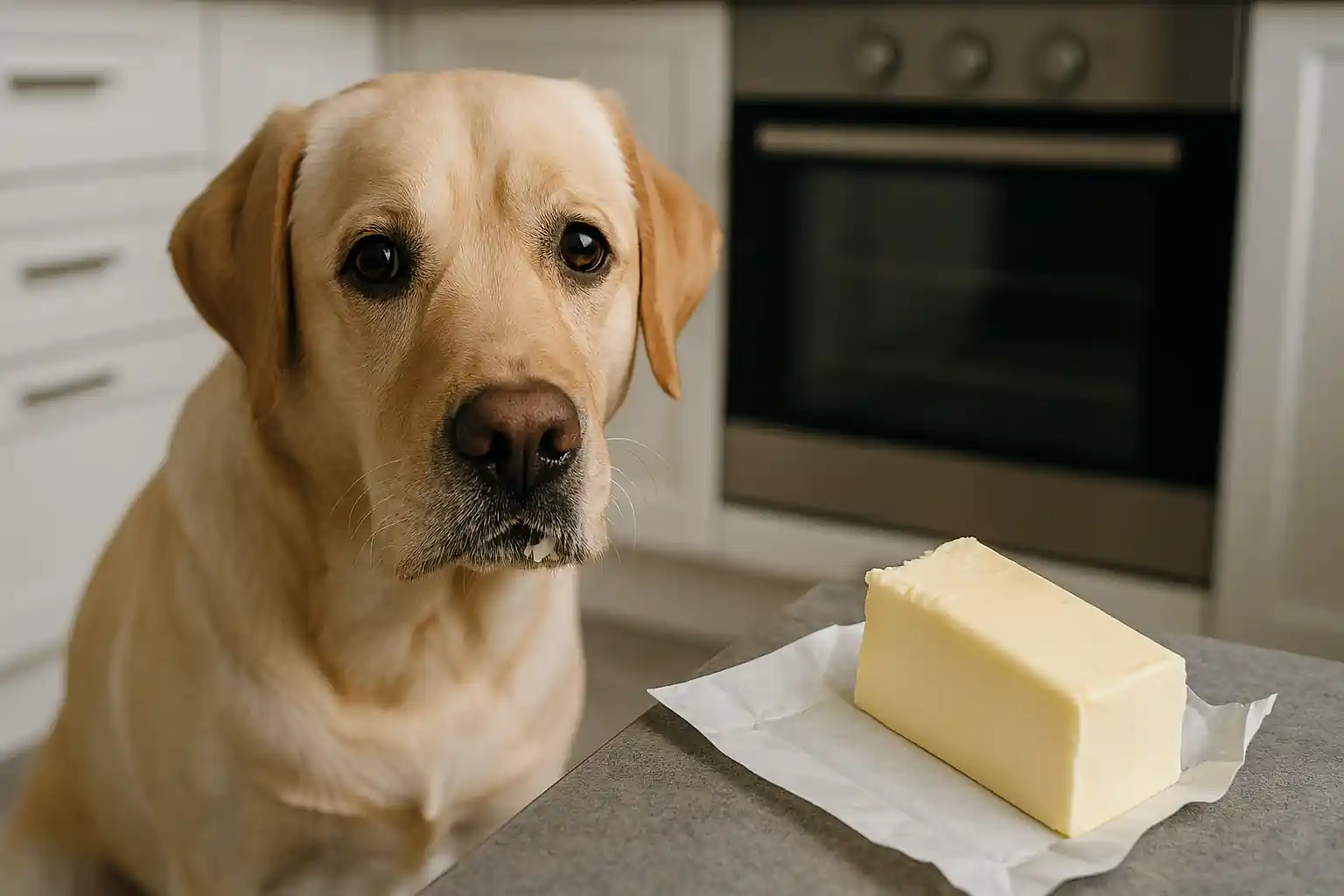My Dog Ate Butter: What Happens When Dogs Eat Butter and How to Respond
Butter might seem harmless, but if your dog just ate butter, you may wonder whether it’s dangerous, how much butter is too much, and if you should call a veterinarian. Dogs love butter for its rich taste, yet butter is high in fat and can upset their gastrointestinal system. This article explains why butter is bad for dogs in large amounts, the risks like vomiting and diarrhea, and when to contact your vet. If your pup ate a stick of butter or even a little bit of butter, here’s what you need to know to keep them safe.
Can Dogs Eat Butter Safely?
Butter is a dairy product that contains a very high fat content. While butter is not toxic to dogs, it is not considered safe for dogs to eat regularly. Butter isn’t toxic to dogs, but it can cause an upset stomach, vomiting, diarrhea, or even pancreatitis if eaten in large amounts. Butter is high in fat and has little nutritional value for pups compared to proper dog food.
Some dog owners may give their pup a little bit of butter on bread or food, thinking it’s harmless. A tablespoon of butter contains 12 grams of fat, which is a lot for a dog, especially if it’s a smaller breed. Dogs should not eat butter as part of their diet, and it’s not a good idea to feed your dog fatty foods like butter because of the health risks.
Why Is Butter Bad for Dogs?
The main reason butter is bad for dogs is its high fat content. Butter is high in fat, and large amounts of butter can cause pancreatitis, obesity, or abdominal pain. Pancreatitis is a painful condition where the pancreas becomes inflamed, often triggered by fatty foods like butter. Symptoms of pancreatitis include vomiting, diarrhea, and abdominal pain.
Butter can also contribute to weight gain and obesity in dogs. Obesity in dogs leads to long-term health issues like heart strain, diabetes, and joint problems. Butter can cause short-term issues like gastrointestinal upset, but butter can also create long-term risks if fed often. Dogs shouldn’t eat butter, and moderation is key if a dog happens to lick a bit of butter from the counter.
What Happens if a Dog Ate Butter Accidentally?
If your dog just ate butter, the reaction depends on the amount of butter consumed and your pup’s size. A dog ate half a stick of butter may show mild vomiting or diarrhea, while a dog that ate an entire stick of butter could suffer from pancreatitis or intestinal blockage.
Dog owners should keep a close eye on your dog if they eat butter. Watch for signs of gastrointestinal distress, such as vomiting, diarrhea, lethargy, or abdominal discomfort. If your dog ate a whole stick of butter or if your dog has eaten a large amount, it’s best to contact your veterinarian.
Is Butter Toxic to Dogs or Just Unhealthy?
Butter isn’t toxic, but butter isn’t safe for dogs either. Butter is not toxic to dogs in the way chocolate or grapes are, but it is still dangerous for dogs in large amounts. Dogs should not have butter regularly, because butter is high in fat, and amounts of butter can cause pancreatitis.
The truth is butter isn’t toxic to dogs, but dogs should not eat butter. Butter may cause mild gastrointestinal issues, or in severe cases, butter can cause pancreatitis, which requires immediate veterinary care.
Symptoms to Watch For: Vomiting, Diarrhea, and Abdominal Pain
If your pup eats butter, monitor for gastrointestinal symptoms. The most common reactions are vomiting and diarrhea. Vomiting and diarrhea happen because butter is difficult for the digestive system to handle, especially with its high fat content.
Dogs may also experience abdominal pain, lethargy, or signs of pancreatitis. If your dog ate butter and shows these symptoms, it may be time to give your vet a call. A veterinarian can assess whether your pup needs treatment for pancreatitis or another gastrointestinal condition.
What Should You Do If Your Dog Ate a Stick of Butter?
If your dog ate a stick of butter, don’t panic. Butter isn’t toxic, but eating an entire stick of butter can be dangerous for dogs. The large amounts of fat in a stick of butter can trigger pancreatitis, gastrointestinal upset, or an intestinal blockage.
If your dog eats a large amount of butter, contact your veterinarian right away. Your vet will ask about the amount of butter your dog consumed, whether it was salted butter or regular butter, and whether your pup is showing symptoms. A dog may vomit or have diarrhea after eating much butter, but a vet can help determine whether emergency treatment is necessary.
Can a Small Amount of Butter Hurt My Pup?
If your dog licks a bit of butter off your hand or gets a small amount of butter from buttered bread, it usually won’t cause major problems. A small amount of butter may cause mild upset stomach, but it won’t generally lead to pancreatitis.
However, dogs should not eat butter regularly, even in small amounts. Dogs and butter don’t mix well because butter is high in fat and offers no real benefit. Butter can cause long-term issues like obesity and weight gain if given frequently. Even though butter is not toxic, it’s safer to give your dog proper dog food and treats instead.
Does Margarine Affect Dogs the Same Way as Butter?
Many dog owners wonder if margarine is safer than butter. Margarine, like butter, is high in fat and not safe for your dog to eat regularly. Margarine may contain oils and additives that can upset your pup’s stomach.
Dogs should not have butter or margarine. Both can cause gastrointestinal upset, obesity, and pancreatitis if consumed in large amounts. Dogs shouldn’t eat fatty foods like butter or margarine, as both can be dangerous for dogs.
Why Dogs Love Butter and Buttered Bread
Dogs love butter because of its strong smell, creamy texture, and high fat content. Many dogs love butter so much they will jump on counters to steal it. Dogs love butter, but dogs shouldn’t eat it because of the health risks.
Dogs also enjoy buttered bread, but it’s not safe for dogs. Buttered bread adds fat without nutrition and can contribute to weight gain. Dogs to eat bread occasionally isn’t harmful, but when cooked in butter or spread with fatty foods like butter, it becomes dangerous for dogs.
How Veterinarians Treat Dogs That Eat Butter
If your dog ate butter, a veterinarian may recommend monitoring at home or bringing the pup in for treatment. If your dog has eaten a large amount of butter and shows signs of pancreatitis, the vet may provide IV fluids, pain relief, and medications to reduce vomiting and diarrhea.
Veterinarians often stress that dogs should not have butter because butter can cause obesity, pancreatitis, and gastrointestinal issues. If your dog eats a large amount, contact your veterinarian immediately. Early treatment is essential if symptoms of pancreatitis appear.
Tips for Dog Owners: Keeping Fatty Foods Like Butter Away
Dog owners should keep butter out of reach. Dogs shouldn’t eat fatty foods like butter, margarine, or other high fat snacks. Store butter safely in the refrigerator and avoid leaving it on the counter where many dogs love to steal it.
If you want to give your dog a treat, give your dog healthy snacks instead. Dog food and safe dog treats are always better options. Dogs should not eat butter, and it’s not a good idea to feed your dog fatty foods. Keep a close eye on your dog to prevent accidental butter theft.
Final Thoughts on Dogs and Butter
Dogs love butter, but butter is not safe for dogs. Butter isn’t toxic, but it can cause gastrointestinal problems, pancreatitis, and obesity. Whether your pup ate a whole stick of butter or just a bit of butter, it’s important to monitor them and contact your veterinarian if symptoms appear.
Key Takeaways:
-
Butter is not toxic to dogs, but it is unhealthy.
-
Butter is high in fat and can cause pancreatitis, obesity, and abdominal pain.
-
A dog ate butter in large amounts should see a vet.
-
Small amounts of butter may cause mild upset stomach but are still not safe.
-
Dogs love butter and buttered bread, but dog owners should avoid feeding it.
-
If your dog just ate butter, keep a close eye on your dog and contact your veterinarian if symptoms worsen.

